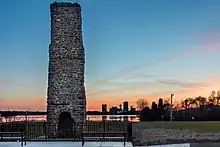Daniel-Marie Chabert de Joncaire de Clausonne | |
|---|---|
| Born | c. 1714 |
| Died | 1771 (aged 56–57) |
| Occupation(s) | Army officer Iroquois interpreter |
| Known for | Establishment of Fort du Portage |
| Parent |
|
| Relatives | Philippe-Thomas Chabert de Joncaire (brother) |
Daniel-Marie Chabert de Joncaire de Clausonne[lower-alpha 1] (c. 1714 – 1771) was a French army officer and interpreter in New France who established Fort du Portage near Niagara Falls and fought in the French and Indian War.
Early life
Daniel-Marie Chabert de Joncaire de Clausonne was born to Louis-Thomas Chabert de Joncaire (1670–1739) and Marie-Madeleine Le Gay.[1][2][3] He was baptized on January 6, 1714 in Repentigny, New France.[2] He was the younger brother of Philippe-Thomas Chabert de Joncaire and was often confused for both his father and brother.[2]
Like his brother, Joncaire was sent to live with the Iroquois at a young age.[2] He also lived with the Ottawa, Ojibwa, and Shawnee and later married the Seneca Marguerite-Élisabeth-Ursule Rocbert de La Morandière in Montreal.[2]
Career
In 1739 and 1740, Joncaire was a cadet, took part of the force sent to assist Jean-Baptiste Le Moyne de Bienville's attack on the Chickasaws in the Chickasaw Campaign of 1739, and then served as the interpreter during the negotiations of the subsequent peace treaty.[2]

In 1748, Joncaire was promoted to ensign.[2] In 1748, Daniel-Marie replaced his brother Philippe-Thomas as the principal agent for New France among the Iroquois after Philippe-Thomas's resignation.[2] Joncaire commanded the construction of a new fort, called Fort du Portage or Little Niagara Fort, 1.5 miles above Niagara Falls to intercept furs intended for the British at Fort Oswego.[2][4] In 1750, Joncaire built a small canal above Niagara Falls to power a sawmill.[3] In 1757, Joncaire was promoted to lieutenant.[2]
In 1759, he had Fort du Portage burned down and moved his garrison to reinforce Fort Niagara.[2] On July 25, 1759, Joncaire was one of the officers who signed the surrender at the Battle of Fort Niagara.[2]
Later life
The British were relieved when Joncaire left Canada in 1761 due to his influence among the natives.[2] Upon his return, Joncaire was implicated in the Canada Affair during the Seven Years' War and consequently imprisoned in the Bastille.[2] During his trial, his defence was based on records which were destroyed when he burned down Fort du Portage; the court found him guilty of carelessness in his inventories of provisions in 1763 but effectively acquitted him with a warning against future recurrences.[2]
In 1764, Joncaire went to London and unsuccessfully asked the King George III for the land of the former Fort du Portage.[2] He was prevented by Governor James Murray from trading with the native population in Niagara, but was later given permission by William Johnson and Murray's successor, Guy Carleton.[2] He died in Detroit in 1771 and was buried on July 5.[1][2][3]
Notes
References
- 1 2 3 Zoltvany, Yves F. (1982) [1969]. "Chabert de Joncaire, Louis-Thomas, Sononchiez". Dictionary of Canadian Biography. Vol. 2. University of Toronto/Université Laval.
- 1 2 3 4 5 6 7 8 9 10 11 12 13 14 15 16 17 18 19 Dunn Jr., Walter S. (1979). "Chabert de Joncaire de Clausonne, Daniel-Marie". Dictionary of Canadian Biography. Vol. 4. University of Toronto/Université Laval.
- 1 2 3 Eisenstadt, Peter (2005). Encyclopedia of New York State. Syracuse University Press. p. 1110. ISBN 978-0-8156-0808-0.
- ↑ Scheer, Mark (June 8, 2010). "Local Historian Trying to Revive Old Chimney as Tourist Attraction". Niagara Gazette. Retrieved March 17, 2021.